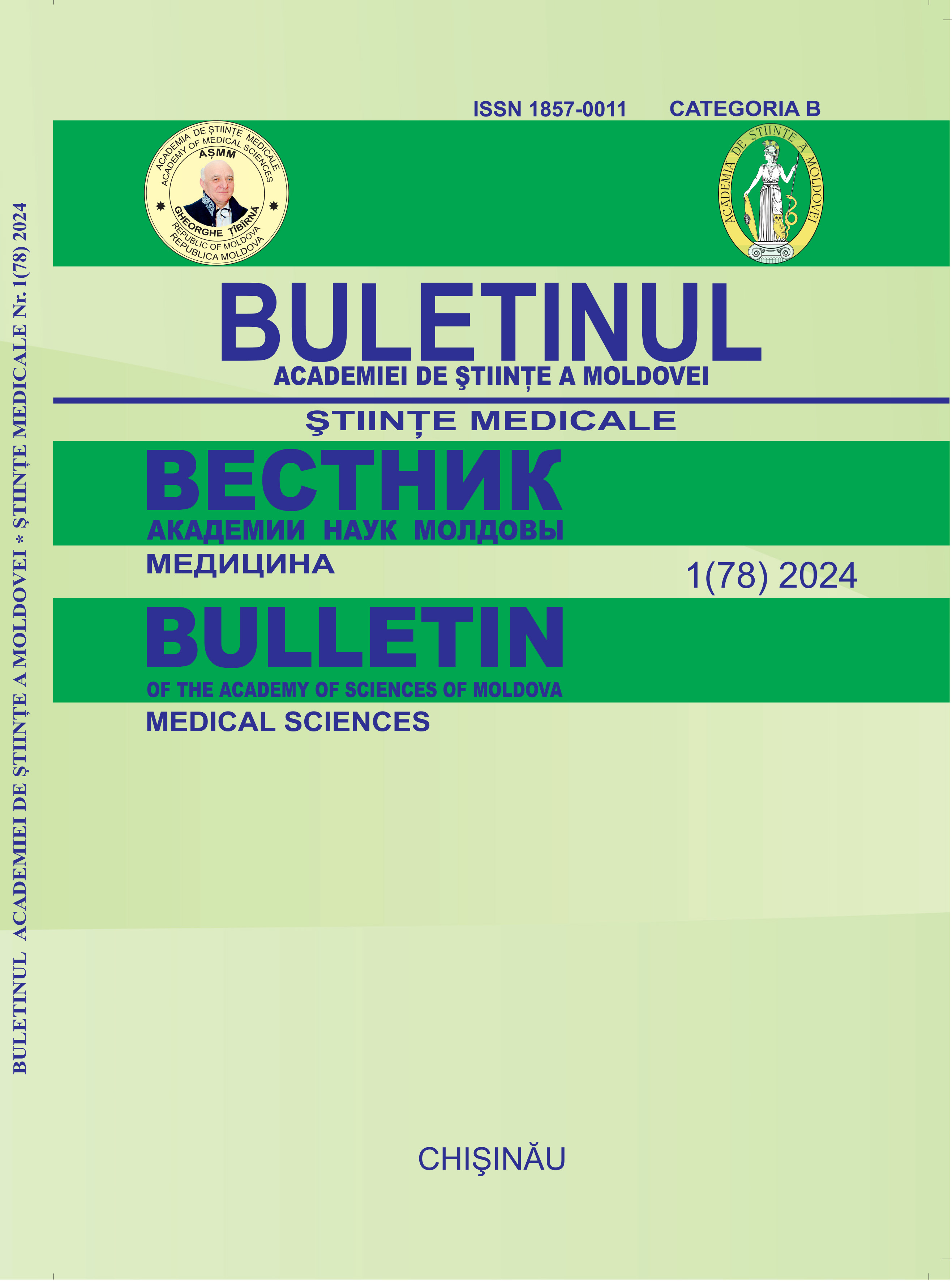Новые подходы к оценке и стратификации сердечно-сосудистого риска
DOI:
https://doi.org/10.52692/1857-0011.2024.1-78.15Ключевые слова:
Cердечно-сосудистыe заболевания, прогнозирование риска, оценка риска, первичная профилактика, 10-летний риск ССЗ, пожилые люди, сахарный диабетАннотация
Сердечно-сосудистые заболевания остаются серьезной и растущей проблемой в Республике Молдова, на которую приходится более половины всех случаев смерти и которые приводят к значительной заболеваемости. В настоящее время признано, что бремя сердечно-сосудистых заболеваний (ССЗ) можно уменьшить за счет энергичного снижения риска и первичной профилактики, которые остаются важным приоритетом для всех разработчиков политики в области здравоохранения. Будучи одной из европейских стран с высоким риском сердечно-сосудистых заболеваний, Молдова сталкивается с большими трудностями в реализации мер профилактики сердечно-сосудистых заболеваний как на популяционном, так и на индивидуальном уровне. В данной статье обобщены основные новшества недавно опубликованных рекомендаций Европейского общества кардиологов (ESC) по профилактике сердечно-сосудистых заболеваний, рассмотрены их положительные стороны, а также применимость в рутинной клинической практике с учетом социально-экономических особенностей Молдовы. Оценка сердечно-сосудистого риска является важным шагом для уменьшения возникновения неблагоприятных сердечно-сосудистых событий. Усилия по профилактике атеросклеротических сердечно-сосудистых заболеваний сосредоточены на выявлении пациентов, у которых лечение факторов риска сердечно-сосудистых заболеваний принесет наибольшую пользу.
Библиографические ссылки
ESC Guidelines on cardiovascular disease prevention in clinical practice: Developed by the Task Force for cardiovascular disease prevention in clinical practice with representatives of the European Society of Cardiology and 12 medical societies With the special contribution of the European Association of Preventive Cardiology (EAPC), Eur Heart J, Vol 42, 2021, p. 3227–3337
ACC/AHA Guideline on the Primary Prevention of Cardiovascular Disease: A Report of the American College of Cardiology/American Heart Association Task Force on Clinical Practice Guidelines. Circulation. 2019;140:e596–e646
Anuarul statistic al sistemului de sănătate din Moldova, Chișinău aa 2021 - 2022
Ebrahim S, Taylor F, Ward K, et al. Multiple risk factor interventions for primary prevention of coronary heart disease. Cochrane Database Syst Rev 2011:CD001561
Si S, Moss JR, Sullivan TR, Newton SS, Stocks NP. Effectiveness of general practice-based health checks: a systematic review and meta-analysis. Br J Gen Pract 2014;64:e47-53.
Koon K. Teo, MBBCh, PhD, FRCPC, FCCS, and Talha Rafiq, MSc Cardiovascular Risk Factors and Prevention: A Perspective From Developing Countries. Canadian Journal of Cardiology 37 (2021) 733-743
Guy De Backer, New insights in cardiovascular risk estimation and stratification. e-Journal of Cardiology Practice Vol. 22, N° 16 - 22 Jun 2022
V.Arrarte,et al./Comments on the 2021ESC Guidelines on cardiovascular disease prevention in clinical practice. Rev Esp Cardiol.2022;75(5):364–369367
ESC/EAS Guidelines for the management of dyslipidaemias: lipid modification to reduce cardiovascular risk: The Task Force for the management of dyslipidaemias of the European Society of Cardiology (ESC) and European Atherosclerosis Society. Eur Heart J, Vol 41, Issue 1, 2020, p. 111–188
Mancia G, Kreutz R, Brunström M, et al. 2023 ESH guidelines for the management of arterial hypertension the Task Force for the management of arterial hypertension of the European Society of Hypertension: endorsed by the International Society of Hypertension (ISH) and the European Renal Association (ERA). J Hypertens 2023;41:1874-2071.
ESC Guidelines for the management of cardiovascular disease in patients with diabetes: Developed by the task force on the management of cardiovascular disease in patients with diabetes of the European Society of Cardiology. Eur Heart J, Vol 44, Issue 39, 2023, p. 4043–4140
STEPS: prevalence of noncommunicable disease risk factors in the Republic of Moldova, 2021, WHO, https://www.who.int/europe/publications/i/item/WHO-EURO-2022-6785-46551-67555
Protocol Clinic Național ,, Prevenția Bolilor Cardiovasculare”, PCN-423,Ministerul Sănătăți, Republica Moldova, https://ms.gov.md/legislatie/ghiduri-protocoale-standarde/cardiologie-2/
Ian M Graham, Emanuele Di Angelantonio, Radu Huculeci, New Way to „SCORE” Risk: Updates on the ESC Scoring System and Incorporation into ESC Cardiovascular Prevention Guidelines, Curr Cardiol Rep 2022 Nov;24(11):1679-1684.
SCORE2-OP risk prediction algorithms:estimating incident cardiovascular event risk in older persons in four geographical risk regions, SCORE2-OP working group and ESC Cardiovascular risk collaboration, European Heart Journal (2021) 42, p. 2455–2467
Carlos Brotonsa, Irene Morala, Diana Fernándeza, et al. Assessment of the New SCORE OP Cardiovascular Risk Charts in Patients Older Than 65 Years. Rev Esp Cardiol., Vol. 69. Issue 10, pages 981-983
SCORE2-OP Working Group and ESC Cardiovascular Risk Collaboration. SCORE2-OP risk prediction algorithms: estimating incident cardiovascular event risk in older persons in four geographical risk regions. Eur Heart J 2021;42:2455-67
Lin JS, Evans CV, Johnson E, Redmond N, et al. Nontraditional Risk Factors in Cardiovascular Disease Risk Assessment: Updated Evidence Report and Systematic Review for the US Preventive Services Task Force. JAMA 2018;320:281–297
Orsolya Csenteri1, Zoltán Jancsó1, Gergő József Szöllösi1, Differences of cardiovascular risk assessment in clinical practice using SCORE and SCORE2, BMJ (2022) Volume 9, Issue 2
SCORE2-Diabetes: 10-year cardiovascular risk estimation in type 2 diabetes in Europe, SCORE2- Diabetes Working Group and the ESC Cardiovascular Risk Collaboration, European Heart Journal (2023) 44, 2544–2556
Comprehensive Management of Cardiovascular Risk Factors for Adults With Type 2 Diabetes, Circulation. 2022;145:e722–e759. DOI: 10.1161/CIR.0000000000001040
Liew SM, Lee WK, Khoo FM, et.al. Can doctors and patients correctly estimate cardiovascular risk? A cross-sectional study in primary care. BMJ Open. 2018;8:e01771.
Conroy RM, Pyörälä K, Fitzgerald AP, et al; SCORE project group. Estimation of ten-year risk of fatal cardiovascular disease in Europe: the SCORE project. Eur Heart J. 2003;24:987-1003
De Backer GG. New risk markers for cardiovascular prevention. Curr Atheroscler Rep. 2014;16:1-8.
Cooney MT, Selmer R, Lindman A, Tverdal A, Menotti A, Thomsen T, De Backer G, De Bacquer D, Tell GS, Njolstad I, Graham IM; SCORE and CONOR investigators. Cardiovascular risk estimation in older persons: SCORE-O.P. Eur J Prev Cardiol. 2016; 23: 1093-103.
Загрузки
Опубликован
Лицензия
Copyright (c) 2024 Вестник Академии Наук Молдовы. Медицина

Это произведение доступно по лицензии Creative Commons «Attribution» («Атрибуция») 4.0 Всемирная.



